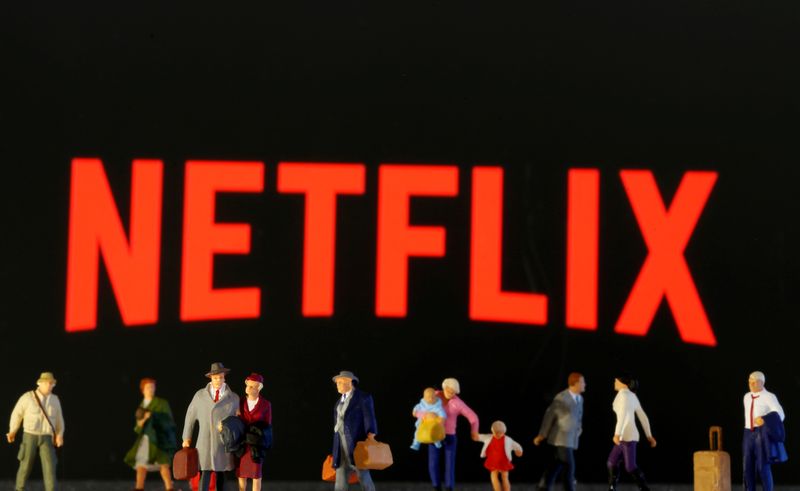By Lisa Richwine and Akanksha Rana
(Reuters) - Netflix Inc (O:NFLX) more than doubled its own projections for new customers as quarantined audiences binged on series such as "Tiger King," but the company predicted a weaker second half of the year if stay-at-home orders to fight the coronavirus are lifted.
The world's largest streaming service gained 15.8 million paying customers from January through March, bringing its global total to 182.9 million. Netflix had predicted it would add 7 million during the period.
The company warned that it expected fewer new subscribers from July to December compared with a year earlier, however. Many people who would have joined then are likely to have already signed up, executives said.
"We expect viewing to decline and membership growth to decelerate as home confinement ends," Netflix said in a letter to shareholders.
The company is among the few businesses to benefit from government orders imposed in March to keep people away from each other in order to stop the spread of the highly infectious novel coronavirus. While the S&P 500 Index (SPX) has fallen 19% from its Feb. 19 record high, Netflix has gained 11% during the same period.
Netflix also issued a bullish forecast that it would add 7.5 million new customers for the current quarter, which ends in June, though the company said it was "mostly guesswork" given uncertainty over when stay-at-home orders might be lifted. Analysts surveyed by FactSet had expected 3.8 million.
Investing.com senior analyst Haris Anwar said Netflix's big gains showed "it's the ultimate stay-at-home stock."
"That said, there's no guarantee that a global recession and increased competition won't hit Netflix in the latter part of the year," Anwar said. "There's little clarity from the company about the future, and that's likely to hurt the stock in the short run."
Netflix said the shutdown of film and TV production around the world had temporarily increased its free cash flow but could delay some programming by a quarter. In the second quarter, the impact will be "modest" and mostly will affect dubbing in various languages, the company said.
Most programming for 2020, and much of 2021, already has been filmed and is being finished remotely in post-production, Chief Content Officer Ted Sarandos said in a post-earnings interview with an analyst.
"We don't anticipate moving the schedule around much, certainly not in 2020," Sarandos said.
For the just-ended quarter, Netflix's earnings per share fell short of analyst expectations. The company posted diluted earnings per share of $1.57, below the $1.65 consensus, according to IBES data from Refinitiv.
Total revenue rose to $5.77 billion from $4.52 billion. Analysts on average had expected $5.76 billion.
Appreciation of the U.S. dollar, due partially to the coronavirus crisis, dragged on international revenue, the company said.
In the quarter, Netflix true-crime documentary "Tiger King," about a colorful Oklahoma zookeeper, became a cultural sensation. It also released reality show "Love is Blind," and a new season of Spanish-language thriller "Money Heist."
As streaming video has grown in the United States, the market has become more competitive with the debut of Walt Disney Co's (N:DIS) Disney+ and upcoming rivals. That has pushed Netflix to look for growth overseas.
The company's biggest expansion from January through March came from Europe, where it added 4.4 million new customers.
The most popular Netflix plan in the United States costs $13, nearly double the $7-per-month cost for Disney+.
Netflix does not currently plan to raise its prices given the global pandemic, Chief Product Officer Greg Peters said.
"At this point we are not even thinking about price increases," Peters said.

Shares of Netflix were up 0.5% at $436 in after-hours trading.